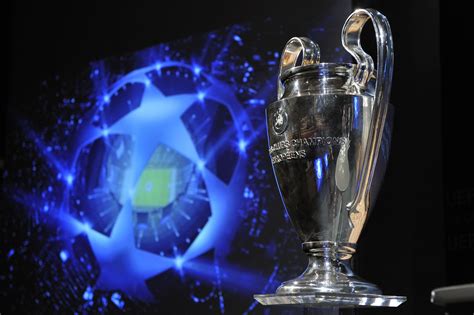UEFA Champions League: Europe's Elite Football Tournament

Discover the history, top clubs, and impact of UEFA Champions League. Learn about the best performers and how the tournament format has evolved.The UEFA Champions League is undoubtedly one of the most prestigious and highly anticipated football tournaments in the world. With a rich history, featuring some of the top clubs from across Europe, it consistently delivers exhilarating matches and unforgettable moments. In this blog post, we’ll delve into the captivating story behind the tournament’s inception and evolution, explore the impact it has had on European football, and highlight the top performers who have left an indelible mark on the competition. We’ll also take a look at the clubs that have dominated the tournament and examine how its format has evolved over the years. Join us as we take a deep dive into the UEFA Champions League, celebrating the unforgettable moments and the incredible talent that has graced the competition over the years. Whether you’re a die-hard football fan or simply curious about the world of European football, this post is sure to captivate and educate you.
History of UEFA Champions League
The UEFA Champions League is an annual club football competition organized by the Union of European Football Associations (UEFA) and contested by top-division European clubs. It is one of the most prestigious tournaments in the world and also one of the most prestigious football leagues in the world. The competition was first introduced in 1955 as the European Champion Clubs’ Cup, with the first final taking place in 1956. The tournament rebranded as the UEFA Champions League in 1992, opening up new horizons for club football in Europe.
Since its inception, the Champions League has grown to become the ultimate stage for the top football clubs from across Europe to showcase their talent and compete for the title of European champions. The competition has witnessed some of the most memorable moments in football history and has played a significant role in shaping the future of European football.
Over the years, the tournament has evolved, with changes made to the format and regulations to keep up with the demands of modern football. From the knockout stages to the introduction of group stages, the Champions League has undergone various modifications, making it more competitive and appealing to football fans around the world.
Clubs with Most Titles
Clubs with Most Titles
The UEFA Champions League has been the stage for some of the most prestigious clubs in European football to showcase their talent and compete for the ultimate prize. Over the years, there have been several clubs that have dominated the tournament and etched their names in the history books with multiple title wins.
One such club is Real Madrid, which holds the record for the most titles in the tournament’s history. With a staggering 13 titles to their name, the Spanish giants have been a powerhouse in European football for decades. Their dominance in the tournament is unparalleled, and their success has cemented their status as one of the greatest clubs in the history of the sport.
Another club that has left a lasting impact on the UEFA Champions League is AC Milan. The Italian club has won the tournament 7 times, making them one of the most successful clubs in the competition. Their rich history and strong performances have solidified their place as one of the elite clubs in European football.
Impact on European Football
Impact on European Football
The UEFA Champions League has had a significant impact on European football since its inception in 1955. The tournament has provided a platform for the best clubs in Europe to compete against each other, leading to a rise in the overall standard of football across the continent. The increased competition has pushed clubs to invest in top talent, modern training facilities, and advanced tactics, resulting in a higher level of play in domestic leagues as well.
Furthermore, the financial incentives of participating in the Champions League have led to a redistribution of wealth within European football. The tournament’s prize money, TV rights, and commercial revenue have allowed smaller clubs to compete with the traditional powerhouses, increasing the overall competitiveness of the sport. This has also resulted in a more diverse pool of clubs representing their countries in European competitions, further enriching the footballing landscape.
On a cultural level, the Champions League has become a global phenomenon, attracting fans from all corners of the world. This, in turn, has enhanced the image of European football and contributed to its global expansion. The tournament has also influenced the style of play, as clubs often adapt their tactics to counter the strengths of their European opponents, leading to a more diverse and open-minded approach to the game.
Top Performers in the Tournament
The UEFA Champions League has been the stage for some of the greatest football talents in the world. Over the years, several players have left a lasting impact on the tournament with their exceptional performances. From goal-scoring machines to midfield maestros, these players have set the standard for excellence in the Champions League.
One of the top performers in the tournament is Lionel Messi. The Argentine forward has been a constant force in the Champions League, mesmerizing fans with his dribbling skills and clinical finishing. With numerous records to his name, Messi has cemented his status as one of the greatest players in the history of the competition.
Another standout performer is Cristiano Ronaldo. The Portuguese superstar has consistently delivered in the Champions League, showcasing his incredible athleticism and goal-scoring prowess. With multiple titles and countless memorable moments, Ronaldo’s impact on the tournament is truly iconic.
Evolution of the Tournament Format
The UEFA Champions League has undergone several changes in its tournament format since its inception in 1955. The evolution of the tournament format has been marked by a series of modifications aimed at improving the competition’s quality and increasing its global appeal. From its early stages as a knockout competition featuring just a small number of teams, to its current format as a 32-team group stage followed by knockout rounds, the tournament has seen significant changes over the years.
One of the most significant changes in the tournament format occurred in 1992, with the introduction of the group stage. Prior to this, the competition was a straight knockout tournament, which meant that the margin for error was incredibly small. The group stage allowed for more matches to be played, giving teams a better chance to prove their worth and making the tournament more competitive. This change also led to an increase in the number of teams participating in the tournament, making it more inclusive and diverse.
In recent years, there have been discussions about the possibility of further changes to the tournament format, such as the introduction of a promotion and relegation system similar to domestic leagues. While these discussions have not yet materialized into concrete changes, they signify the ongoing evolution of the UEFA Champions League and its continuous efforts to innovate and adapt to the ever-changing landscape of football.





